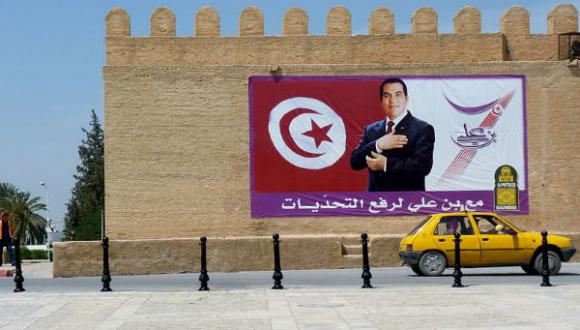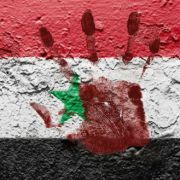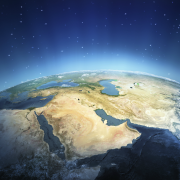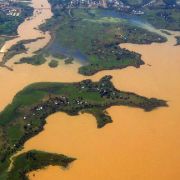Expert Analysis: What Ben Ali Stole
Tunisia: What Ben Ali Stole
by Paul Rivlin
Iqtisadi: Middle East Economy, Volume 4, Number 5 - Moshe Dayan Center for Middle Eastern and African Studies
In October 2011, the Norwegian newspaper "Aftenposten" published confidential U.S. embassy communications, revealed by Wikileaks, on nepotism and corruption in Tunisia that had been sent to the U.S. State Department in Washington, D.C. in 2009.
The embassy stated that according to local polls, business confidence was declining, and business leaders stressed that foreign and domestic investment was insufficient for continued growth. In early 2006, the Arab Institute of Business Leaders and the Young Entrepreneurs Center released separate investment climate surveys that pointedly criticized Tunisia's declining levels of business confidence, suggesting the need for "good connections required for business success" was a chief culprit. "Cumbersome administration" and difficulty accessing capital were also notable obstacles for businesses. Fostering entrepreneurship and bolstering creativity and innovation were recognized "areas for improvement," essential if Tunisia was to tap its only plentiful resource: its people.
The importance of wasta (referring to “connections” in Arabic) was a frequently-used word to express the growing disgruntlement over influence and corruption by the country's elite. Tunisia's small population and intimate business environment produced a multiplier-effect for this dissatisfaction, and news traveled fast among those with business and financial interests. The result was a growing chorus of complaints from the local business community who felt their ambition was stifled in an increasingly frustrating business milieu. As a result, a new element was emerging - younger and desiring more rapid progress, impatient to carve out their own livelihoods, reactive to restrictions on the spirit and energy of the most talented and educated citizens, and disdainful of the persistent government pronounced directives of a planned economy.
Corruption, a perceived lack of opportunity, and weakness in the rule of law worked to exacerbate other problems, such as lack of financing opportunities, limited entrepreneurship, and local investment. The small local entrepreneur had to plough through complicated tax and other regulations that she/he believed the connected few circumvent. Increasingly, Tunisian contacts reported that those with family connections to President Ben Ali were exploiting the market to line their own pockets. Economic regulations and legal procedures did not apply to the politically connected, which created confusion and discouraged domestic entrepreneurship and investment. Tunisians viewed real estate or offshore accounts as the only safe options for investment, yet neither effectively contributed to sustained economic growth. The lack of transparency also harmed Tunisia's international profile and discouraged foreign investment that was essential to continued growth. Transparency International's 2005 Corruption Index ranked Tunisia 43 of 159 countries, with a score of 4.9, or slightly below the 5.0 borderline score that distinguishes countries that do from those that do not have a serious corruption problem. In 2011, Tunisia ranked 73rd among 183 countries in the index, with a score of 3.8.
When talking about corruption, Tunisians rarely discussed President Zine el Abidine Ben Ali without mentioning "the Family," which includes the extended families of his children and his present wife, Leila (nee Trabelsi). It seemed that at least half of the country's elite were rumored to be somehow related or connected to the president. The Ali and Trabelsi clans were an increasingly large group that had established important control in major business sectors, the media, and in the politically significant sports world. While verifying the rumors of their holdings was nearly impossible, as few were willing to confirm particular assets, the extent of these rumors provided some evidence of their accuracy.
This has changed with the publication in March 2014 of a World Bank report entitled "All in the Family State Capture in Tunisia" that calculated the volume of assets accumulated by Ben Ali and his family. This is the first time that such a “capture of the state” has been quantitatively analyzed using official statistics. Before examining the findings of the report, it is necessary to look at what has happened in Tunisia in recent years.
Zine el Abidine Ben Ali was the second President of Tunisia from 1987 to 2011. Ben Ali was appointed Prime Minister in October 1987, and he became president on November 7, 1987 in a bloodless coup d'état that ousted President Habib Bourguiba. Ben Ali was subsequently reelected with enormous majorities, each time exceeding 90% of the vote; the final re-election was on October 25, 2009.
On January 14, 2011, following a month of protests against his rule, Ben Ali and his family were forced to flee to Saudi Arabia. The interim government that took over after Ben Ali fled asked Interpol to issue an international arrest warrant, charging him for money laundering and drug trafficking. On June 20, 2011, a Tunisian court sentenced Ben Ali and his wife in absentia to 35 years in prison on charges of theft and unlawful possession of cash and jewelry. In June 2012, he was sentenced to life imprisonment for inciting violence and murder, and in April 2013 received a life sentence in a military court for violent repression of protests in the city of Sfax.
Tunisia was often considered to have one of the few successful economies in the Arab world, especially among the non-oil states in the years leading up to the “Jasmine Revolution.” Its population is ethnically and religiously homogenous; its borders have been recognized for many years, and a tradition of centralized government predate its colonization by France in 1881. Despite the lack of natural resources, its 11 million people enjoyed relatively good standards of health, education, and other public services. It had a high level of home ownership and stable, if not rapid, economic growth at an annual average of 5 percent for the past two decades. Its economy, integrated with the outside world, was a modest magnet for investment in manufacturing, offshore services, and tourism.
That, it turned out, was a rather superficial and misleading description of reality. Unemployment among university graduates, officially estimated at 14 percent, was closer to 20 percent, and for the 20-29 age group as a whole was 27 percent. While the majority of unemployed were young, low-skilled, male, urban workers, the increase in unemployment in recent years affected mostly university graduates, notably women graduates (48 percent) and the interior regions of the country. Information that became available after the revolution also revealed the fact that economic development had been heavily concentrated geographically along the coast, with the interior increasingly lagging behind. In 2010 poverty rates ranged from 8-9 percent in Grand Tunis and the Center East region to as much as 26 and 32 percent in the North West and Center West regions respectively.
Economic policy under Ben Ali was based on undercutting European labor costs, and so many of the available jobs were unskilled and low-paid. The development of the high-tech sector was limited by the government and so suitable jobs for university graduates were scarce. At the same time, Tunisia's success at building a middle class meant that a black market economy was too small to absorb and support street vendors and house servants on the same scale as in Egypt and Morocco.
According to the World Bank a good "de jure" business environment performance hid deep "de facto" governance problems, especially in the domestic “onshore” sector. Tunisia did fairly well according to most business environment indicators, in part because those indicators reflected the de jure processes best, and in part also because the information came mainly from foreign companies, which in Tunisia usually operate in the offshore sector and therefore faced a better business environment. In the offshore sector foreign capital accounted for at least 66 percent of equity and at least 70 percent of production was for export (with some exception in agriculture). In the onshore sector, foreign equity was limited to 49 percent in most non-industrial projects, while onshore industrial projects could have up to 100 percent foreign equity. By opening up parts of the economy and giving official treatment to foreign investors, Ben Ali gave the impression that Tunisia was very open but this took the spotlight away from the rest of the economy that remained protected by barriers to entry and price controls. This web of controls rigged markets in favor of the ruling clan and those close to the regime at the expense of the rest.
The economy was hampered by substantial discretion in the application of laws and regulations, inefficient procurement processes, rigged privatization, the declassification of public land assets, and the improper use of public banks. The highly centralized decision making process undermined the system of checks and balances, resulting in low transparency and accountability. More generally, substantial discretion was practiced in the application of the laws. The lack of adequate participation, transparency, and accountability exacerbated the population’s sense of unfairness.
The Ben Ali “family” used its position to engage in rent-seeking activities: a type of money-making enterprise made possible by political connections. These activities can range from outright graft to a lack of competition, poor regulation, and the transfer of public assets to firms at bargain prices. Well-placed people have made their fortunes this way ever since rulers had enough power to issue profitable licenses, permits, and contracts to their cronies. Over the years, Ben Ali he issued 22 presidential decrees resulting in 73 amendments to the business code. Sometimes they were designed to confirm the business interests of the clan. In 2007, for example, a rule was made requiring government authorization for firms producing cement. This came just as Ben Ali's brother-in-law established a new company called Carthage Cement.
In 2011, after the revolution, the government began a confiscation process. This involved seizing the assets of 114 individuals, including Ben Ali himself, his relatives, and in-laws, and related to assets acquired from 1987 forward. The assets seized included 550 properties, 48 boats and yachts, 40 stock portfolios, 367 bank accounts, and about 400 enterprises, not all of which operated in Tunisia. The officially estimated value of these assets was about $13 billion, equal to more than one quarter of Tunisia's 2011 GDP.
The World Bank used tax data provided by Tunisia’s Ministry of Finance relating to more than 600,000 firms. They found that between 1996 and 2010 the 220 companies owned by Ben Ali and his relatives accounted for 3 percent of assets and earned 21 percent of all the country’s private-sector profits. This was due to the fact that firms owned by the Ben Ali clan were larger than their competitors and their performance was superior to that of others. This was possible because they were active in regulated sectors of the economy and these regulations were used to prevent competition from firms outside the clan, including investment from abroad. The report states that the regulatory framework was manipulated by the authorities in favor of firms owned by the clan. Not only was the regulatory framework "captured" by Ben Ali, and used for his personal benefit, but it was extended for the benefit of the entire clan. This had macro-economic costs: investments were not made according to economic criteria but according to connections to the ruling family.
These problems were not confined to Tunisia. Former President Mubarak of Egypt and his two sons have been found guilty of embezzling $17 million. The scale and impact of capturing the state in Egypt may never be revealed as it has been in Tunisia, but the revelations and quantifications are now a central issue in the politics and economics of the region.
 Iqtisadi: Middle East Economy is a monthly e-newsletter providing subscribers with economic analysis of key players and events affecting the marketplaces and societies of the Middle East.
Iqtisadi: Middle East Economy is a monthly e-newsletter providing subscribers with economic analysis of key players and events affecting the marketplaces and societies of the Middle East.






